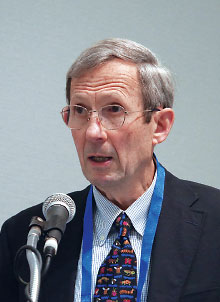Annual Meeting Panel to Examine the Evolution of Physician Aid in Dying
Abstract
Panel members will discuss the challenge of defining standards for “irremediability” in psychiatric disorders and will discuss the impact of expanding laws regarding physician-assisted dying on marginalized populations suffering from life distress.
Physician Aid in Dying (PAD), also known as Medical Aid in Dying (MAiD) has been legalized or decriminalized in over a dozen jurisdictions around the world, and assisted dying policies continue to evolve, including in the United States. Many jurisdictions are exploring whether to introduce PAD laws or expand existing law to include PAD based on a mental disorder.

“The psychiatrist helping patients to consider this unique and permanent request has a responsibility to assess for potentially treatable contributing conditions, including demoralization,” says John Peteet, M.D.
This year’s Annual Meeting in San Francisco will feature a panel discussion titled “Physician-Assisted Death and Psychiatric Disorders.” PAD for mental disorders has been permitted for two decades in the Netherlands and Belgium, and 2023 marks the legalization of the practice in Canada (to be introduced as of March 2023).
John Peteet, M.D., will explore how capacity for PAD may differ from capacity to refuse treatment. He is an associate professor of psychiatry at Harvard Medical School and director of the psychosocial oncology and palliative care fellowship at the Dana-Farber Cancer Institute.
“I plan to focus on the role of the psychiatrist in evaluating patients for capacity to request MAiD, which is a role we play in several U.S. jurisdictions now,” he told Psychiatric News. “I’ll be suggesting that rather than a straightforward assessment of depression and the intellectual understanding of what is involved, the psychiatrist as a physician helping patients to consider this unique and permanent request has a responsibility to assess for potentially treatable contributing conditions, including demoralization.”
Case examples will illustrate that at stake is not only the patient’s cognitive capacity and DSM diagnosis, but also the patient’s emotional capacity and the professional and clinical responsibility of the doctor to the patient.
K. Sonu Gaind, M.D., a professor of psychiatry at the University of Toronto and past president of the Canadian Psychiatric Association, will review the Canadian experience, as Canada moves toward providing MAiD for patients with psychiatric disorders. Gaind is on the Council of Canadian Academies Expert Panel reviewing PAD for mental disorders.
Marie Nicolini, M.D., Ph.D., psychiatrist and researcher at the Belgian Research Foundation Flanders and Georgetown University, will discuss the history of PAD for patients with psychiatric disorders in the Netherlands and Belgium.
Panel members will discuss the challenge of defining adequate standards for “irremediability” in psychiatric disorders and patient requests for PAD and discuss the potential impact of expanding PAD laws on marginalized populations suffering from life distress. ■



